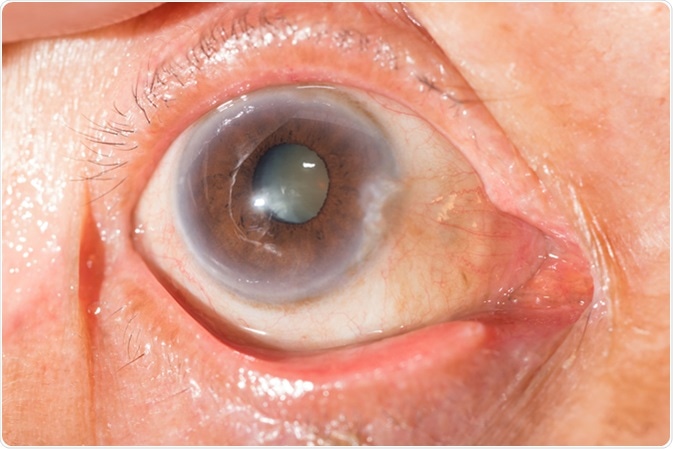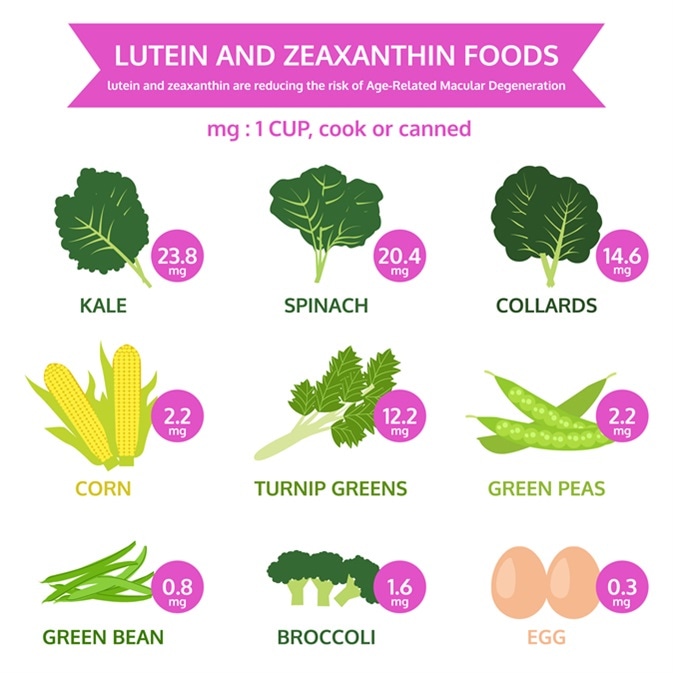Healthy vision is important in ensuring quality of life. Two common threats to aging eyes are cataracts and age-related macular degeneration (AMD) which can, however, be prevented to some extent by a good diet.

Close up of the senile cataract during eye examination, senile cataract, mature cataract, neuclear sclerosis cataract. Image Credit: ARZTSAMUI / Shutterstock
Some important nutrients are found in common foods, and including them in the daily diet will help to preserve good vision throughout life. Antioxidants protect tissues from the toxic effects of free radicals which lead to a breakdown of cell membranes and nucleic acids. Free radicals are formed when tissue is exposed to ultraviolet radiation as from direct sunlight, in cigarette smoke, and other air pollutants. The retina is exposed to a lot of light and is therefore a prime spot for free radical damage, which makes it all the more important to provide antioxidants that reduce the high level of oxidative stress.
Specific Nutrients
Lutein and zeaxanthin: Found in spinach and kale, as well as other green leafy vegetables, and also eggs, these powerful antioxidants, which are typically found together in food, are known to reduce the risk of AMD as well as cataracts. They enter the retina and the lens and prevent degenerative changes, absorbing light frequencies such as blue and ultraviolet frequencies, which promote free radical formation, especially the vulnerable macular area. Other sources include kiwis, grapes, collard greens, and broccoli.

Lutein and zeaxanthin foods, info graphic food, fruit and vegetable icon vector. Image Credit: Plalek / Shutterstock
Vitamin C or ascorbic acid is found in fruits and vegetables, and may reduce the risk of cataracts. AMD may also be slowed if vitamin C and other nutritional factors are taken in combination. Vitamin C is found in grapefruit, strawberries, Brussels sprouts, ripe papayas, oranges, and green peppers.
Vitamin E or alpha-tocoferol is another powerful antioxidant found in nuts, sweet potatoes, and fortified cereals. It is also found in sunflower seeds, wheat germ oil, and vegetable oils.
Essential fatty acids: these fats are not synthesized in the human body but are required for the proper health and functioning of the nervous system, for energy metabolism and immunity. Among these, omega-3 fatty acids like DHA (docosahexaenoic acid) are vital for retinal function and for the development of vision, being concentrated in the outer parts of the photoreceptor cells. These are anti-inflammatory agents, which helps to prevent AMD. These fatty acids are found in salmon, herring and sardines, as well as tuna, halibut and flounder. Two servings or more a week are advised.
Zinc: this trace mineral is a cofactor in the transport of vitamin A from its storage site in the liver to the retina, where it is converted to melanin. This black pigment is essential in protecting retinal tissues against photodamage. High concentrations of zinc are present in the retina and the choroidal vascular tissue under the retina. Zinc is found in white meats from turkey, oysters, and crab meat, as well as eggs, peanuts, whole grains, and red meats.
Beta carotene which is found in all vegetables and fruits that are deep yellow or orange is part of the essential visual pigments, and its deficiency causes night blindness. Pumpkins, red peppers, kale, carrots, sweet potatoes and winter squash are all prime sources.
Supplements – Do They Play a Role?
AMD may be prevented or slowed using supplements made to AREDS standards. AREDS stands for the pivotal Age-Related Eye Disease Studies which tested the formula of this mix of antioxidants clinically. The current AREDS 2 version contains more lutein and zeaxanthin than before, which covers any dietary deficiency. Unlike many other supplements, it does not have beta-carotene and is therefore safe for smokers or those who have just quit. In this subgroup, this nutrient could cause a higher risk of lung cancer, though only at very high doses.
While no research suggests exactly how much of each of these nutrients is necessary to keep vision in good working order, the good old rule of five or more servings of colorful fruits and vegetables every day, with fish at least twice a week, seems to be most helpful in preventing eye problems with age.
Further Reading
Last Updated: Sep 3, 2018